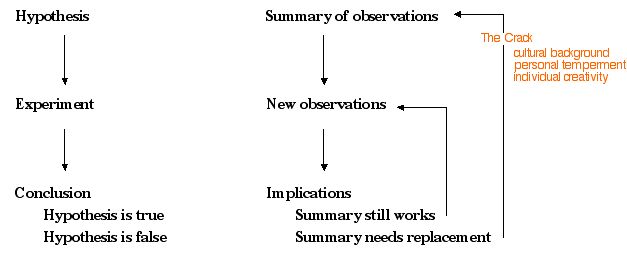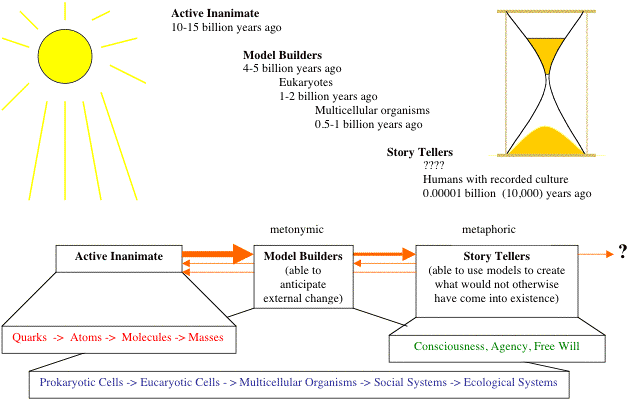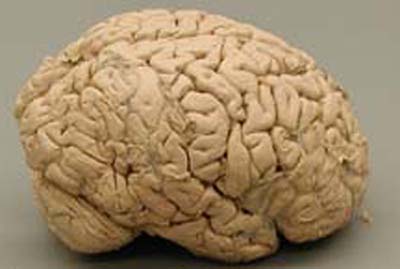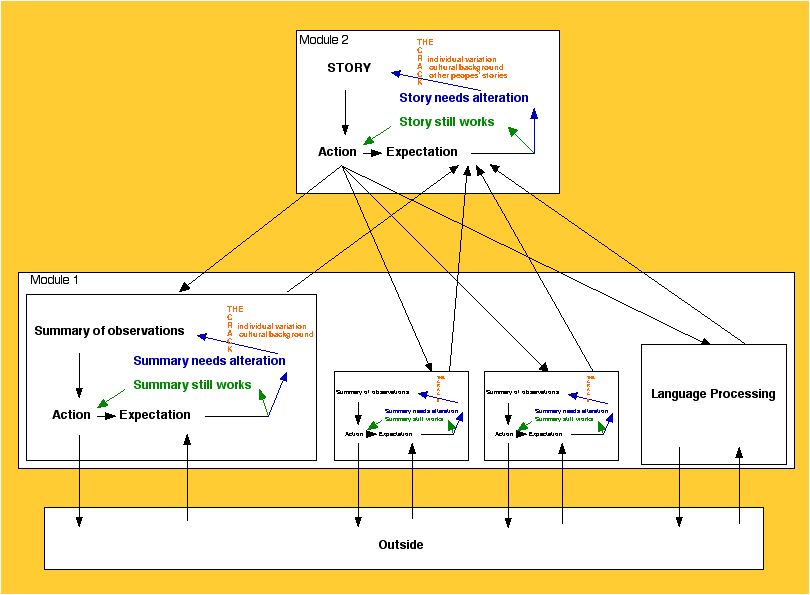Serendip is an independent site partnering with faculty at multiple colleges and universities around the world. Happy exploring!
From biological evolution to emergence: meaning, culture, and esthetics III
The Problem/Solution for Dennett ... for us?:
- "In the beginning was the Word ..." ("logos" -> intent, reason, cause)
- Possibility that it is not so (non-foundationalism), that intent/reason/meaning/esthetics were not present at the beginning, leading to ...
- "fears that the wrong answer [to whether evolution is the
explanation] would have intolerable moral [and other] implications [no
comfort/goodness/personal responsibility]" (Dennett, p 20], ie that
things important to us would prove to be shams/illusions
- Dennett's solution ...
Selfish genes, selfish memes, exploration within a fixed landscape/library, emergent meaning/intentionality/morality within that constraint, a semi-inevitable outcome in which individuals, societies, cultures exist but have no causal significance beyond their own histories
"Darwin has shown us how, in fact, EVERYTHING is just such a product [of mindless purposeless forces] ... Darwin offers us [a convincing explanation of how God is distributed in the whole of nature]: it is in the distribution of Design through out nature, creating, in the Tree of Life, an utterly unique and irreplaceable creation ... that wonderful wedding of chance and necessity ... [that] just happened to happen, in the fulness of time ... it did make the ivy twine and the sky so blue, so perhaps the song I love tells a truth after all ... it is surely a being that is greater than anything any of us will ever conceive of in detail worthy of its detail ... I can stand in affirmation of its significance." (p 520)
- Paul's problem (maybe yours?) ...
Admiration and awe is all very fine, but I want to be an agent, to MATTER, not only to be shaped by but to shape, to be more than a product of genes and memes.
science itself will teach man... that he himself is something of the nature of a piano-key or the stop of an organ... so that everything he does is not done by his willing it, but is done of itself, by the laws of nature....even if this were proved to him by natural science and mathematics, even then he would not become reasonable, but would purposely do something perverse out of simple ingratitude, simply to gain his point.... the whole work of man really seems to consist in nothing but proving to himself every minute that he is a man and not a piano-key! .... Fyodor Dotoevsky, Notes From Underground, 1864
Can we do better about individuals? about cultures? Are they more than their histories? A different story ...
Step 1. The relation between evolution as a non-foundational narrative story and science
| Linear science | Seriously loopy, story teling science |

|
|
| Science as successive approximations to Truth
Non-narrative? |
Science as ongoing story telling and story revision: repeated making of observations, interpreting and summarizing observations, making new observations, making new summaries ... individually and collectively Science as skepticism, a style of inquiry that can be used for anything, one which everybody is equipped to to/can get better at/be further empowered by, and contribute to - a way of making sense of what is but even more of exploring what might yet be Narrative? (see The Nature of Science) |
Where in biological inheritance is the "crack"? "personal temperment," "individual creativity," "cultural background"? Are these simply direct consequences of biological inheritance, some of the "traditional details" that need to "perish," "losses to be regretted," or something more? And, if something more, do we need to look elsewhere for them or can they be accounted for within a non-foundational story that Darwin helped initiate?
Looking elsewhere for selves and cultures ...
Finding selves and cultures (plus) within evolution = emergence

Individuals and cultures (including meaning, intention, esthetics) were not present at the beginning, don't exist in some different parallel world (foundationalism, but also don't disappear, ...
They are instead themselves outcomes of an evolutionary process based in randomness and,
once having come into being,
they in turn become causal influences in that process, using randomness. Therefore there is more than history.
Humans share with all other living organisms the wherewithal to explore forms of life, creating new ones, not fully explained by history, in the process
and can do so as well though story telling
The story telling brain as a new development in evolution (a new form that in turn ...)
 |
 |
 |
Neocortex gives us the capacity to tell stories, to go beyond experiences, to conceive/explore/bring into existence new worlds, to create meaning using randomness and out of randomness

An unconscious AND a conscious "crack", with randomness playing a role in both
Both self and culture can influence story which in turn can influence unconscious
Conscious crack an accelerator of evolutionary exploration
Creates not only form but meaning and esthetics, personality responsibility, free will
 Dennett's skyhooks are anchored in .... another more fixed, permanent, eternal world; his attack is on such other worlds, not actually on skyhooks per se
Dennett's skyhooks are anchored in .... another more fixed, permanent, eternal world; his attack is on such other worlds, not actually on skyhooks per se
Brain is a skyhook anchored in .... the brain; the brain is a crane but is capable of conceiving things that are not fully accounted for by history and acting to try and create them; it is therefore also a skyhook
Biological evolution does "explain" either individuals or cultures. Both have properties that are allowed but not determined by biological evolution. Perhaps though it is worth recognizing that both individuals and cultures derive from biological evolution, and so would be expected to display some of its properties.
- Heritability, history-dependence
- Non-essential categories
- Differential persistance dependent on context
- Influence of randomness
- Persistant exploration of novel possibilities




Comments
Post new comment